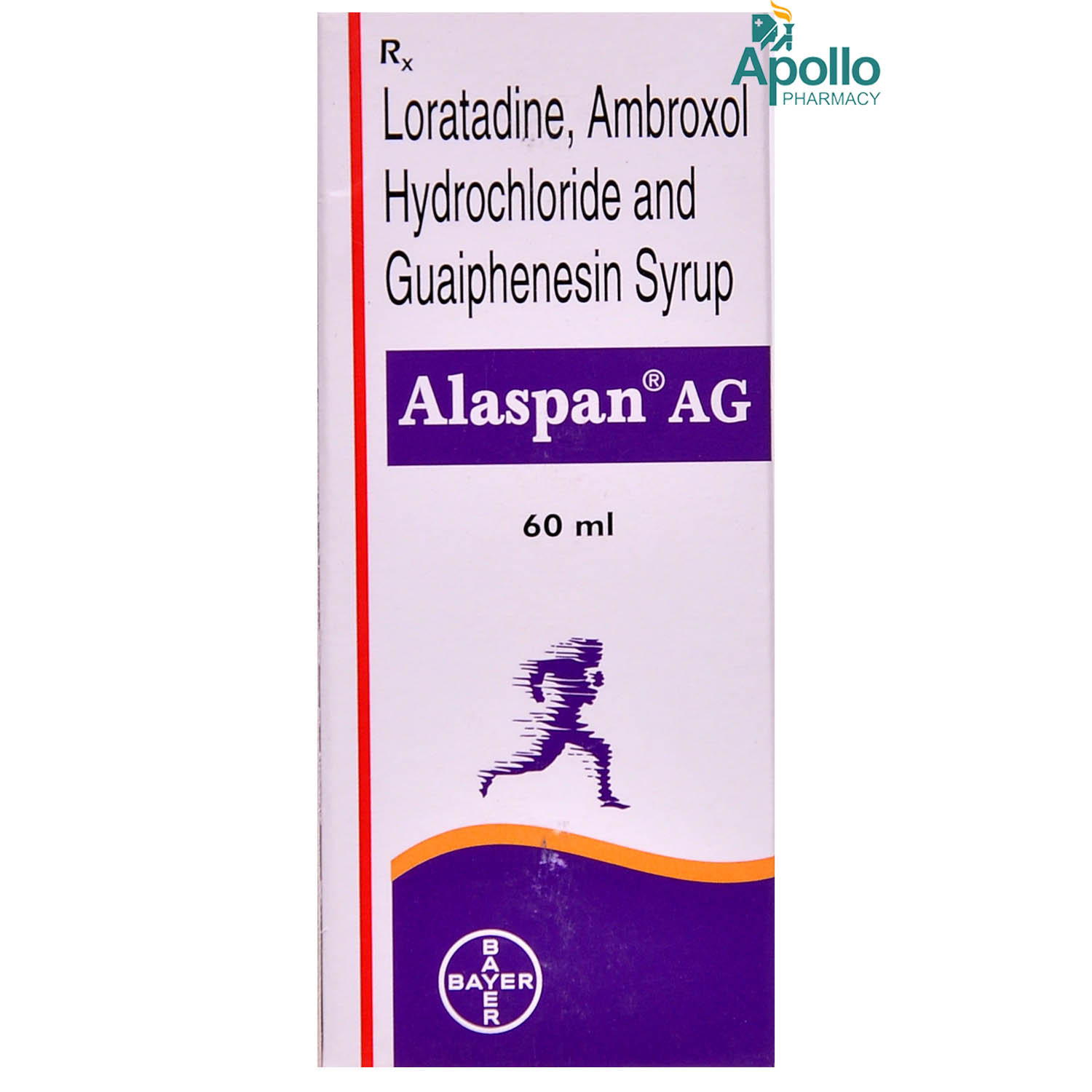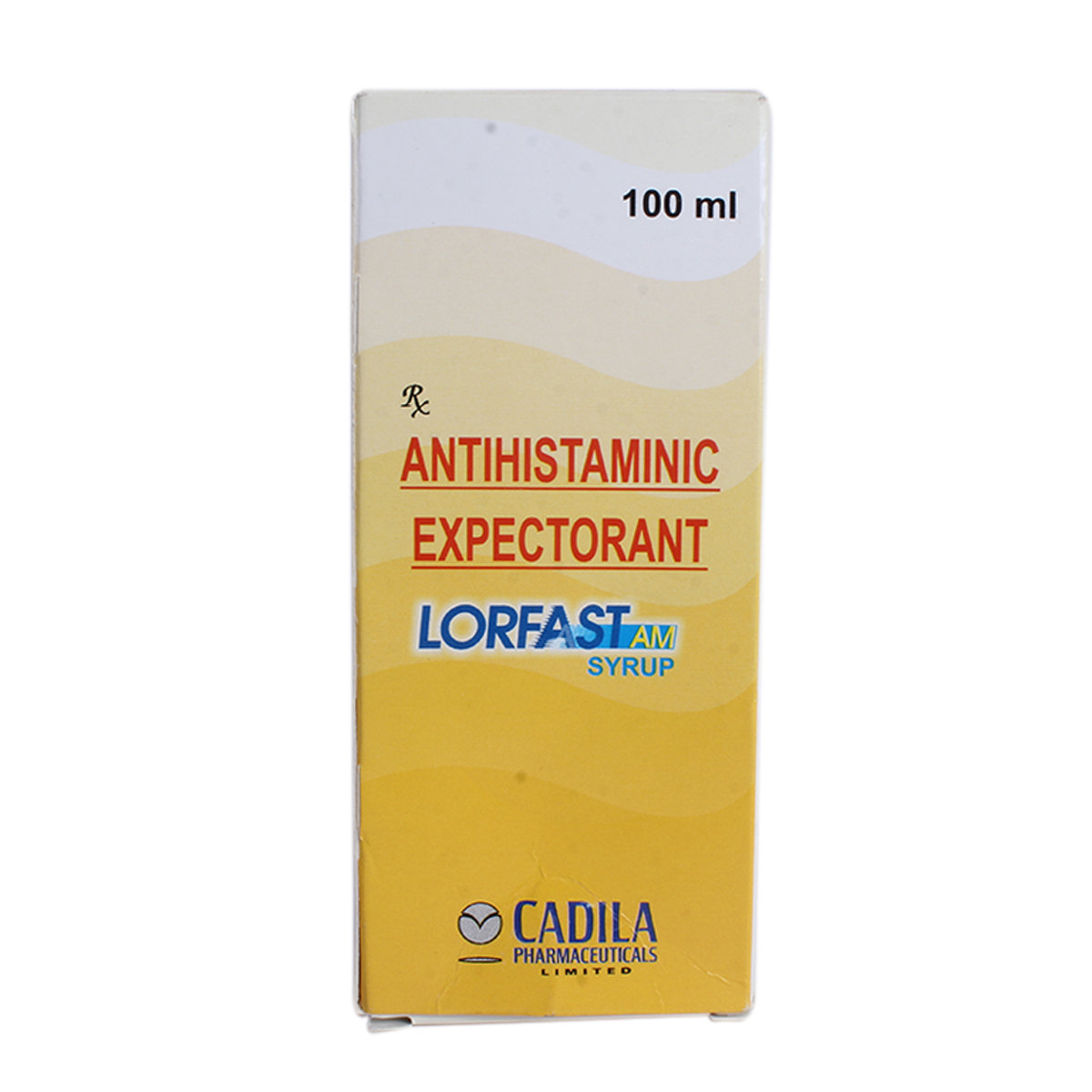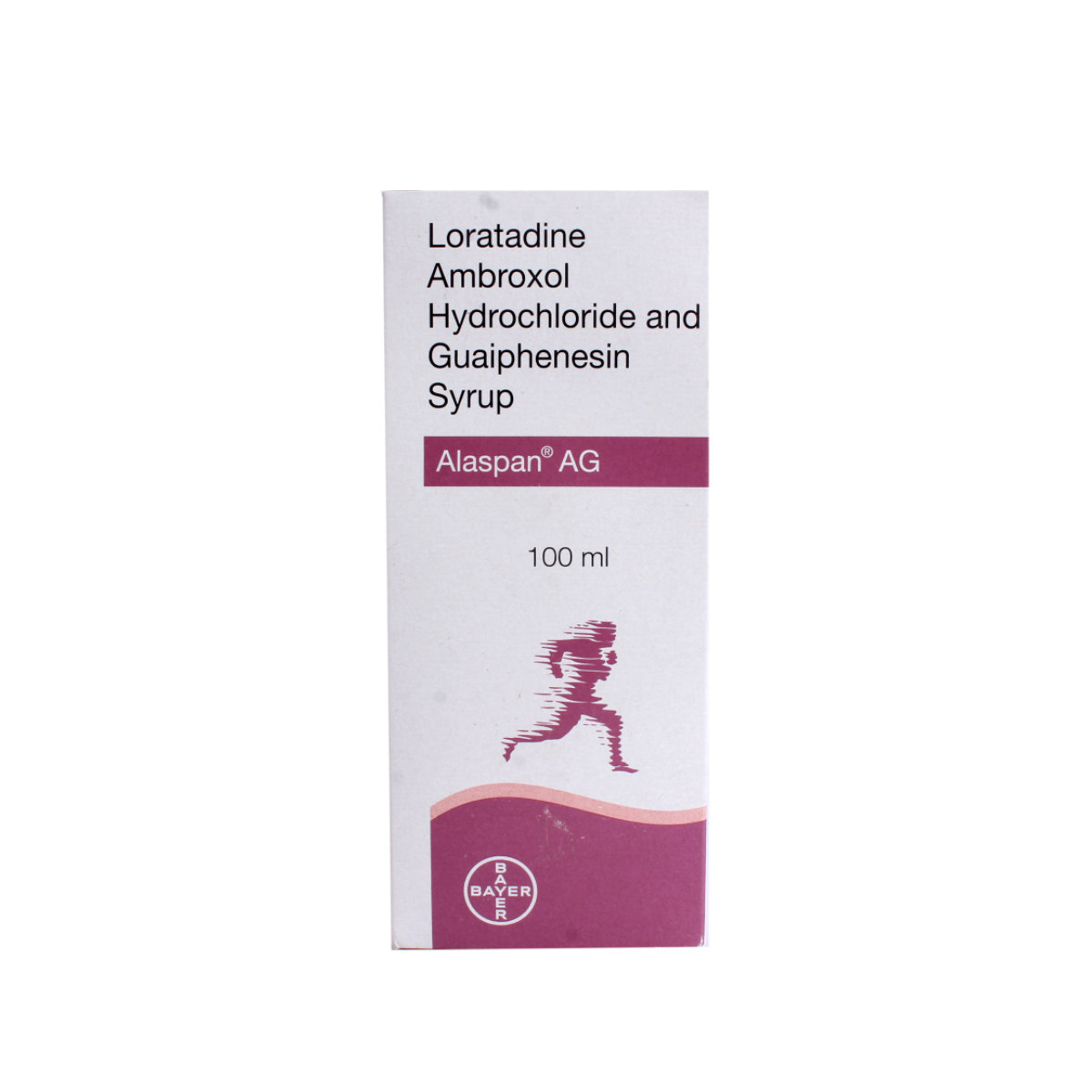Loratadine+ambroxol+guaifenesin
About Loratadine+ambroxol+guaifenesin
Loratadine+ambroxol+guaifenesin belongs to a class of cough and cold preparations primarily used to treat allergic symptoms (like sneezing, watery eyes, runny nose, itchy nose/throat), common cold symptoms, and cough. An allergy is an immune system response to foreign elements typically not harmful to your body. These foreign elements are known as ‘allergens.’ It is also used to induce sleep, treat Parkinson's disease, and relieve cough caused by minor throat or airway irritation.
Loratadine+ambroxol+guaifenesin is a combination drug containing three medicines: Loratadine, ambroxol, and guaifenesin. Loratadine works by blocking the action of histamine, a substance responsible for causing allergic reactions. It directly acts on the brain and relieves symptoms of allergies by preventing the release of histamine. It helps to provide relief from symptoms of allergy such as sneezing, running nose, watery eyes, itching, swelling, and congestion or stiffness. Ambroxol belongs to the class of mucolytic agents (cough/sputum thinner) that work by thinning and loosening phlegm (mucus) in the lungs, windpipe, and nose. Guaifenesin belongs to the class of expectorants that increase the volume of fluid in the airways, reduce the stickiness of mucus, and remove it from the airways.
Take Loratadine+ambroxol+guaifenesin as suggested. The doctor will adjust the dose you are given according to your condition and response to the medicine. In some cases, you may experience nausea, diarrhea, vomiting, stomach pain, dizziness, headache, allergic reaction, and sleepiness. Most of these side effects of Loratadine+ambroxol+guaifenesin do not require medical attention and gradually resolve over time. However, if the side effects are persistent, reach out to your doctor.
Consume only if the doctor prescribes it. Never encourage self-medication or suggest your medicine to someone else. Inform your doctor, before taking Loratadine+ambroxol+guaifenesin, if you have severe liver or kidney problems, peptic or duodenal ulcers. Increase the intake of fluids so that mucus is loosened. Before using Loratadine+ambroxol+guaifenesin, ask doctor if you are taking alcohol, sedatives or tranquilizers as using Loratadine+ambroxol+guaifenesin with recreational drugs might induce drowsiness. It is advisable not to drive any motor vehicle or operate heavy machinery as increased drowsiness and dizziness can occur after taking Loratadine+ambroxol+guaifenesin. If you are pregnant or a nursing mother, ask a doctor before its use. Speak to your doctor if your symptoms do not go away after taking Loratadine+ambroxol+guaifenesin for 5 days. Before using Loratadine+ambroxol+guaifenesin, speak to your doctor if you are breastfeeding a baby or if you are pregnant.
Uses of Loratadine+ambroxol+guaifenesin
Medicinal Benefits
Loratadine+ambroxol+guaifenesin is a combination drug containing three medicines: Loratadine, ambroxol, and guaifenesin. Loratadine+ambroxol+guaifenesin is primarily used to treat allergic symptoms like sneezing, running nose, watery eyes, itchy nose/throat, common cold, and cough. Loratadine is an antihistamine (anti-allergic drug) that works by blocking the action of histamine, a substance responsible for causing allergic reactions. Thus, it helps provide relief from allergy symptoms such as sneezing/runny nose, red/itchy/watery eyes, throat swelling, itchy throat, and congestion or stiffness. Ambroxol belongs to the class of mucolytic agents (cough/sputum thinner) that work by thinning and loosening phlegm (mucus) in the lungs, windpipe, and nose for coughing out easily. Guaifenesin belongs to the class of expectorants that increase the volume of fluid in the airways, reduce the stickiness of mucus, and remove it from the airways.
Directions for Use
Storage
Side Effects of Loratadine+ambroxol+guaifenesin
- Nausea
- Diarrhea
- Vomiting
- Stomach pain
- Dizziness
- Headache
- Sleepiness
Drug Warnings
If you are taking other antihistamines, please inform your doctor before starting Loratadine+ambroxol+guaifenesin. Increase the intake of fluids so that mucus is loosened. Before using Loratadine+ambroxol+guaifenesin, ask a doctor if you are taking alcohol, sedatives, or tranquilizers, as using Loratadine+ambroxol+guaifenesin with recreational drugs might induce drowsiness. It is advisable not to drive any motor vehicle or operate heavy machinery as increased drowsiness and dizziness can occur after taking Loratadine+ambroxol+guaifenesin. If you are pregnant or a nursing mother, ask a doctor before its use.
Drug Interactions
Drug-Drug Interaction: Loratadine+ambroxol+guaifenesin may interact with antibiotics (amoxicillin, cefuroxime, and erythromycin), and medicines that inhibit cough (codeine).
Drug-Food Interaction: Loratadine+ambroxol+guaifenesin is known to interact with alcohol.
Drug-Disease Interaction: Inform your doctor if you have liver or kidney problems, peptic or duodenal ulcers.
Drug-Drug Interactions Checker List:
Safety Advice

Alcohol
unsafeAvoid alcohol consumption while taking Loratadine+ambroxol+guaifenesin as it could lead to increased drowsiness, dizziness and liver damage.

Pregnancy
cautionPlease consult your doctor if you are pregnant, your doctor will prescribe Loratadine+ambroxol+guaifenesin only if the benefits outweigh the risks.

Breast Feeding
cautionLoratadine+ambroxol+guaifenesin is known to be excreted in breast milk, so its use while breastfeeding should not be done.

Driving
cautionLoratadine+ambroxol+guaifenesin is known to cause drowsiness and dizziness, so driving a car or operating any machinery which requires concentration should not be done.

Liver
cautionLoratadine+ambroxol+guaifenesin to be taken with caution, especially if you have a history of liver diseases/conditions. The dose may have to be adjusted by your doctor.

Kidney
cautionLoratadine+ambroxol+guaifenesin to be taken with caution, especially if you have a history of kidney diseases/conditions. The dose may have to be adjusted by your doctor.

Children
cautionLoratadine+ambroxol+guaifenesin should be given to children only if suggested by a child specialist.
Habit Forming
Diet & Lifestyle Advise
- Some anti-inflammatory compounds in ginger can relax membranes in the airways, which could reduce coughing.
- Staying hydrated is vital for those with a cough or cold. Drinking liquids at room temperature can alleviate cough, runny nose, and sneezing.
- The main cause of a cough is acid reflux. One of the easiest ways to treat this condition and reduce the cough that accompanies it is to avoid foods that can cause acid reflux.
- The immune system is affected by stress and raises the risk of being sick. An individual can exercise regularly, meditate, do deep breathing, and try progressive muscle relaxation techniques to relieve stress.
- To stay fit and safe, try to sleep 7-9 hours each night.
- Maintain personal hygiene and keep your surroundings clean.
Special Advise
It is advised to avoid contact with known allergens (allergy-causing agents) such as pollen, dust etc. Certain food items are known to cause allergies to you.
Patients Concern
Disease/Condition Glossary
Allergy: It is an immune system response to foreign elements typically not harmful to your body. These foreign elements are known as ‘allergens.’ Allergic condition varies from person to person. Some might be allergic to certain foods and seasonal allergies like hay fever. At the same time, others might be allergic to pollen or pet dander. One of the symptoms of allergy is cough.
Cough: Coughing is the body’s way of clearing irritants (like allergens, mucus, or smoke) from airways and preventing infection. Coughs may be dry or productive. A productive cough (wet cough) brings sputum (phlegm, mucus, and other matter) from the lungs. Cough is commonly caused as a response to allergy or viral infection but coughing up mucus is possibly an indication of infection in the respiratory tract. If you are coughing thick, solid white mucus, you may have a bacterial infection in the airways. If the mucus is clear or light-coloured, you may have allergies or a minor infection in the respiratory tract, and yellow or green mucus indicates a respiratory infection.
FAQs
Loratadine+ambroxol+guaifenesin is a combination drug containing three medicines: Loratadine, ambroxol, guaifenesin. Loratadine is an antihistaminic that blocks the action of a chemical messenger (histamine) which may trigger cough due to allergy. Ambroxol belongs to the class of mucolytic agents (cough/sputum thinner) that works by thinning and loosening phlegm (mucus) in the lungs, windpipe, and nose for coughing out easily. Guaifenesin belongs to the class of expectorants that increase the volume of fluid in the airways, reduce the stickiness of mucus, and remove it from the airways. Together it helps relieve allergy symptoms like sneezing, running nose, watery eyes, itching, swelling, congestion, or stiffness.
Loratadine+ambroxol+guaifenesin is known to cause drowsiness and sleepiness, so it is recommended not to drive a car or operate any machinery which requires concentration. Also, do not consume alcohol as it might increase drowsiness.
The most common side effects of Loratadine+ambroxol+guaifenesin are difficulty sleeping, taste disturbance, numbness in mouth and tongue, drowsiness. These side effects usually go away during the treatment.
No, you are not recommended to consume alcohol with Loratadine+ambroxol+guaifenesin as it may increase drowsiness. However, please consult a doctor before consuming alcohol with Loratadine+ambroxol+guaifenesin.
Loratadine+ambroxol+guaifenesin may be used to provide relief from allergic symptoms such as sneezing, runny nose, throat irritation or watery eyes. Loratadine+ambroxol+guaifenesin contains loratadine, an anti-allergic drug that works by blocking the action of histamine, a substance responsible for causing allergic reactions.
Yes, Loratadine+ambroxol+guaifenesin may cause dry mouth as a temporary side effect in some people. It is not necessary for everyone taking Loratadine+ambroxol+guaifenesin to experience this side effect. However, to avoid such side effects, drink plenty of water, regularly rinse your mouth, practice good oral hygiene and suck on sugarless candy. However, if the condition persists or worsens, please consult a doctor.
No, you are not recommended to stop taking Loratadine+ambroxol+guaifenesin without consulting your doctor as it may worsen cough or cause recurring symptoms. Therefore, take Loratadine+ambroxol+guaifenesin for as long as your doctor has suggested it, and if you experience any difficulty while taking Loratadine+ambroxol+guaifenesin, please consult your doctor.






